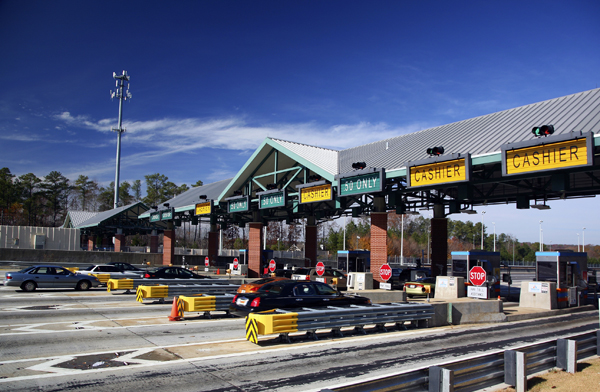Why raise desperately needed transportation funds for a broke region when you could let people drive for free? In Georgia, the state has made up its mind: The DOT will pay $4.5 million to tear down tolls on GA 400 -- and forfeit the $21 million a year the tolls brought in.

It costs just 50 cents to drive 54 miles north and east from the city of Atlanta on GA 400. But last July -- just before voters in the region rejected an effort to fund a multi-modal transportation package -- Gov. Nathan Deal announced that the bond debt was paid off and tolls would be removed this fall.
According to David Emory, president of Atlanta’s Citizens for Progressive Transit, the state decided to announce the toll repeal in the run-up to the T-SPLOST ballot initiative in hopes that it would appeal to voters and encourage them to vote for the transportation tax. “It ended up being a losing strategy,” Emory said, “because we’re losing the toll and the tax didn’t pass.”
It’s extraordinarily difficult to implement tolling on a road that had been free. On roads that receive federal funds, federal law prohibits tolling except for new construction. And politicians never want to ask drivers to pay for what they’re used to getting for free. So Georgia is for all intents and purposes foreclosing the possibility of having GA 400 users pay for the maintenance and upkeep of the road they drive on.
The state could also use those toll revenues for other projects that could take traffic off GA 400 and other roads, and reduce the pressure to build new highways in the future. The tolls have paid for express bus service along GA 400 and for a pedestrian bridge, among other projects, but there's so much more that money could do.
MARTA's red line runs right down the middle of GA 400 in places -- and although the charge to drive on GA 400 is disappearing, "the fare on the MARTA line is definitely not going away," Emory said.
There's been talk of extending the red line farther out into suburban areas that have seen a lot of development recently, like Roswell and Alpharetta. "There certainly is demand for that, but there is no obvious way to pay for it," Emory said. "The MARTA sales tax, which funds the existing system, is pretty much maxed out paying for what we already have. They've had to cut service and raise fares just to make the accounting work. There's going to need to be some kind of outside source to take that rail line north. The toll on that corridor would be an obvious option."
The state tollway authority estimates average weekday traffic at 120,000 drivers, and the road, even with the toll, is often congested. Now the Associated Press reports that the Georgia DOT is predicting a “traffic spike” on the road -- an additional 11,000 vehicles a day. Even federal tolling bans relax for congestion mitigation efforts to price roads. If the 50-cent toll has been keeping 11,000 cars off the road -- and it’s still a congested highway -- why not call the toll a congestion charge and keep it?
"One of the few good things about toll roads, aside from additional funding for transportation projects, is that it’s a disincentive for people to be in their cars," said Brionte McCorkle of the Sierra Club Georgia chapter’s rail committee. "Now that they don't have to pay that 50 cents, we do believe it’s going to encourage more traffic."





